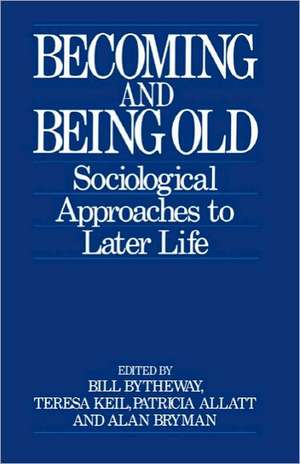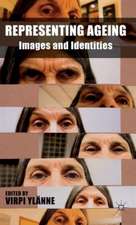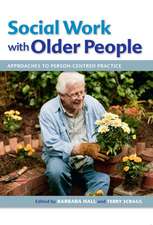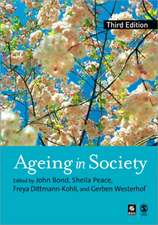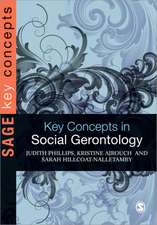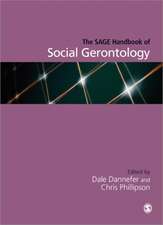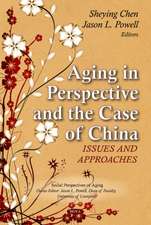Becoming and Being Old: Sociological Approaches to Later Life
Editat de Bill Bytheway, E Teresa Keil, Patricia Allatten Limba Engleză Paperback – 20 aug 1990
Preț: 464.38 lei
Preț vechi: 546.34 lei
-15% Nou
Puncte Express: 697
Preț estimativ în valută:
88.87€ • 92.90$ • 75.10£
88.87€ • 92.90$ • 75.10£
Carte tipărită la comandă
Livrare economică 07-21 martie
Preluare comenzi: 021 569.72.76
Specificații
ISBN-13: 9780803981713
ISBN-10: 0803981716
Pagini: 192
Dimensiuni: 138 x 216 x 10 mm
Greutate: 0.23 kg
Ediția:Revised
Editura: SAGE Publications
Colecția Sage Publications Ltd
Locul publicării:London, United Kingdom
ISBN-10: 0803981716
Pagini: 192
Dimensiuni: 138 x 216 x 10 mm
Greutate: 0.23 kg
Ediția:Revised
Editura: SAGE Publications
Colecția Sage Publications Ltd
Locul publicării:London, United Kingdom
Recenzii
`Stimulating and interesting... should be in libraries as a resource for a variety of tutors and students.' - Nursing the Elderly`This is an exciting collection of papers because it brings together such a variety of research and conceptualizing and places them in a cumulative relationship to each other.... It will have a place in the serious literature and in student bibliographies for some years to come' - Journal of Educational Gerontology
`Well written and thoughtful.... Strongly recommended for all libraries supporting programs in gerontology' - Choice
`A stimulating sample of contemporary British studies of becoming and being old... a well-written set of papers providing new opportunities for the advance of theory and research' - Ageing and Society
`A stimulating and interesting text... should be in libraries as a resource for a variety of tutors and students... of particular interest to those who are undertaking further studies in community nursing whether they be health visitor, community psychiatric or district nurse students. All would find this book a useful resource to `dip' into' - Nursing Standard
'An interesting look at `becoming and being old' from the viewpoint of the academic sociologist' - Help the Aged Today
`Provides a useful introduction to the variety of British research on the later stages of the life cycle. And it also highlights the importance of being aware of such factors as the economy, housing and social welfare provisions in shaping people's experiences of aging' - Canadian Journal of Sociology
`Well written and thoughtful.... Strongly recommended for all libraries supporting programs in gerontology' - Choice
`A stimulating sample of contemporary British studies of becoming and being old... a well-written set of papers providing new opportunities for the advance of theory and research' - Ageing and Society
`A stimulating and interesting text... should be in libraries as a resource for a variety of tutors and students... of particular interest to those who are undertaking further studies in community nursing whether they be health visitor, community psychiatric or district nurse students. All would find this book a useful resource to `dip' into' - Nursing Standard
'An interesting look at `becoming and being old' from the viewpoint of the academic sociologist' - Help the Aged Today
`Provides a useful introduction to the variety of British research on the later stages of the life cycle. And it also highlights the importance of being aware of such factors as the economy, housing and social welfare provisions in shaping people's experiences of aging' - Canadian Journal of Sociology
Cuprins
Introduction
PART ONE: BECOMING OLD
Property Rites? An Investigation of Tenure Change in Middle Age - Cherrie Stubbs
Between Work and Retirement - Frank Laczko
Becoming `Old' in the 1980s
Work-Ending - Tom Schuller
Employment and Ambiguity in Later Life
A Part to Play - Jonathan Long
Men Experiencing Leisure through Retirement
PART TWO: BEING OLD
Transitions in Caring - Sara Arber and G Nigel Gilbert
Gender, Life Course and the Care of the Elderly
Poverty, Care and Age - Bill Bytheway
A Case Study
Differentiation in Later Life - Maria Evandrou and Christina R Victor
Social Class and Housing Tenure Cleavages
The Living Arrangements of the Elderly in Europe in the 1980s - Richard Wall
PART THREE: OLD AGE
Ageing and Old Age - Mike Featherstone and Mike Hepworth
Reflections on the Postmodern Life Course
Does Age Matter? The Case of Old Age in Minority Ethnic Groups - Ken Blakemore
PART ONE: BECOMING OLD
Property Rites? An Investigation of Tenure Change in Middle Age - Cherrie Stubbs
Between Work and Retirement - Frank Laczko
Becoming `Old' in the 1980s
Work-Ending - Tom Schuller
Employment and Ambiguity in Later Life
A Part to Play - Jonathan Long
Men Experiencing Leisure through Retirement
PART TWO: BEING OLD
Transitions in Caring - Sara Arber and G Nigel Gilbert
Gender, Life Course and the Care of the Elderly
Poverty, Care and Age - Bill Bytheway
A Case Study
Differentiation in Later Life - Maria Evandrou and Christina R Victor
Social Class and Housing Tenure Cleavages
The Living Arrangements of the Elderly in Europe in the 1980s - Richard Wall
PART THREE: OLD AGE
Ageing and Old Age - Mike Featherstone and Mike Hepworth
Reflections on the Postmodern Life Course
Does Age Matter? The Case of Old Age in Minority Ethnic Groups - Ken Blakemore
Descriere
In this volume contributors examine the assumptions normally made about the elderly and offer differing sociological perspectives on becoming and being old, and on the concept of age itself. Instead of seeing the elderly in terms of needs, they offer alternative analyses in light of class, gender and race. Examining the life-cycle perspective on old age, they show how retirement from the workforce is only one aspect of becoming old, and arguably one which is important for only a minority of the ageing population.
